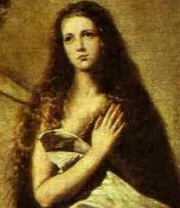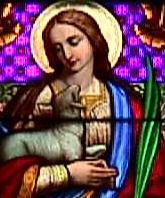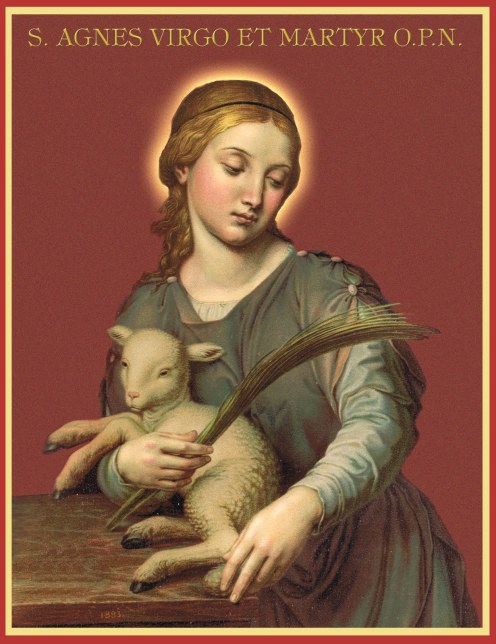18. And the disciples of John and of the Pharisees used to fast: and they come and say to him, Why do the disciples of John and of the Pharisees fast, but your disciples fast not?
19. And Jesus said unto them, Can the children of the bride-chamber fast, while the bridegroom is with them? as long as they have the bridegroom with them, they cannot fast.
20. But the days will come, when the bridegroom shall be taken away from them, and then shall they fast in those days.
21. No man also sews a piece of new cloth on an old garment: else the new piece that filled it up takes away from the old, and the rent is made worse.
22. And no man puts new wine into old bottles: else the new wine does burst the bottles, and the wine is spilled, and the bottles will be marred: but new wine must be put into new bottles.
GLOSS. As above, the Master was accused to the disciples for keeping company with sinners in their feasts, so now, on the other hand, the disciples are complained of to the Master for their omission of fasts, that so matter for dissension might arise amongst them. Wherefore it is said, And the disciples of John and the Pharisees used to fast.
THEOPHYL. For the disciples of John being in an imperfect state, continued in Jewish customs.
AUG. But it may be thought that he added Pharisees, because they joined with the disciples of John in saying this to the Lord, whilst in Matthew relates that the disciples of John alone said it: but the words which follow rather show that those who said it spoke not of themselves, but of others. For it goes on, And they come and say unto him, Why do the disciples, &c. For these words show, that the guests who were there came to Jesus, and had said this same thing to the disciples, so that in the words which he uses, they came, he speaks not of those same persons, of whom he had said, And the disciples of John and the Pharisees were fasting. But as they were fasting, those persons who remembered it, come to him. Matthew then says this, And there came to him the disciples of John, saying, because the Apostles also were there, and all eagerly, as each could, objected these things.
CHRYS. The disciples of John, therefore, and of the Pharisees, being jealous of Christ, ask Him, whether He alone of all men with His disciples could, without abstinence and toil, conquer in the fight of the passions.
BEDE; But John did not drink wine and strong drink, because he who has no power by nature, obtains more merit by abstinence. But why should the Lord, to whom it naturally belonged to forgive sins, shun those whom he could make more pure, than those who fast? But Christ also fasted, lest He should break the precept, He ate with sinners, that you might see His grace, and acknowledge His power. It goes on; And Jesus said to them, Can the children, &c.
AUG. Mark here calls them children of the nuptials, whom Matthew calls children of the bridegroom; for we understand the children of the nuptials to be not only those of the bride-groom, but also of the bride.
PSEUD-CHRYS. He then calls Himself a bridegroom, as if about to be betrothed to the Church. For the betrothal is giving an earnest, namely, that of the grace of the Holy Ghost, by which the world believed.
THEOPHYL. He also calls Himself a bridegroom, not only as betrothing to Himself virgin minds, but because the time of His first coming is not a time of sorrow, nor of sadness to believers, neither does it bring with it toil, but rest. For it is without any works of the law, giving rest by baptism, by which we easily obtain salvation without toil. But the sons of the nuptials or of the Bridegroom are the Apostles; because they, by the grace of God, are made worthy of every heavenly blessing, by the grace of God, and partakers of every joy.
PSEUD-CHRYS. But intercourse with Him, He says, is far removed from all sorrow, when He adds, As long as they have the bridegroom with them, they cannot fast. He is sad, from whom some good is far removed; but be who has it present with him rejoices, and is not sad.
But that He might destroy their elation of heart, and show that He intended not His own disciples to be licentious, He adds, But the days will come when the bridegroom shall be taken, &c. as if He said, The time will come, when they will show their firmness; for when the Bridegroom shall be taken from them, they will fast as longing for His coming, and in order to unite to Him their spirits, cleansed by bodily suffering. He shows also that there is no necessity for His disciples to fast, as having present with them the Bridegroom of human nature, Who every where executes the words of God, and Who gives the seed of life. The sons of the Bridegroom also cannot, because they are infants, be entirely conformed to their Father, the Bridegroom, Who, considering their infancy, deigns to allow them not to fast: but when the Bridegroom is gone, they will fast, through desire of Him; when they have been made perfect, they will be united to the Bridegroom in marriage, and will always feast at the king's banquet.
THEOPHYL. We must also understand, that every man whose works are good is the son of the Bridegroom; he has the Bridegroom with him, even Christ, and fasts not, that is, does no works of repentance, because he does not sin: but when the Bridegroom is taken away by the man's falling into sin, then lie fasts and is penitent, that he may cure his sin.
BEDE; But in a mystical sense, it may thus be expressed; that the disciples of John and the Pharisees fast, because every man who boasts of the works of the law without faith, who follows the traditions of men, and receives the preaching of Christ with his bodily ear, and not by the faith of the heart, keeps aloof from spiritual goods, and wastes away with a fasting soul. But he who is incorporated into the members of Christ by a faithful love cannot fast, because he feasts upon His Body and Blood. It goes on, No one sews a piece of rough that is new cloth on an old garment: else the new piece that fills it up takes away from the old, and the rent is made worse.
PSEUD-CHRYS. As if He said, because these are preachers of the New Testament, it is not possible that they should serve old laws; but you who follow old customs, fitly observe the fasts of Moses. But for these, who are about to hand down to men new and wonderful observances, it is not necessary to observe the old traditions, but to be virtuous in mind; some time or other however they will observe fasting with other Virtues. But this fasting is different from time fasting of the law, for that was one of restraint, this of goodwill; on account of the fervor of the Spirit, Whom they cannot yet receive, Wherefore it goes on, And no one puts new wine into old bottles: else the new wine does burst the bottles, and the wine is spilled, and the bottles will be marred: but new Wine must be put in new bottles.
BEDE; For He compares His disciples to old bottles, who would burst at spiritual precepts, rather than be held in restraint by them. But they will be new bottles, when after the ascension of the Lord, they are renewed by desiring His consolation, and then new wine will come to the new bottles, that is, the fervor of the Holy Ghost will fill the hearts of spiritual men. A teacher must also take heed not to commit the hidden things of new mysteries to a soul, hardened in old wickedness.
THEOPHYL. Or else the disciples are likened to old garments on account of the infirmity of their minds, on which it was not fitting to impose the heavy command of fasting.
BEDE; Neither was it fitting to sew on a new piece; that is, a portion of doctrine which teaches a general fast from all the joy of temporal delights; for if this be done, the teaching is rent, and agrees not with the old part. But by a new garment is intended good works, which are done externally, and by the new wine, is expressed the fervor of faith, hope, and charity, by which we are reformed in our minds.
Catena Aurea Mark 2



 From such liturgical sources we may construct the following "life of St. Agnes". One day when Agnes, then thirteen years old, was returning home from school, she happened to meet Symphronius, a son of the city prefect. At once he became passionately attracted to her and tried to win her by precious gifts. Agnes repelled him, saying: "Away from me, food of death, for I have already found another lover" (r. Ant.). "With His ring my Lord Jesus Christ has betrothed me, and He has adorned me with the bridal crown" (3. Ant., Lauds). "My right hand and my neck He has encircled with precious stones, and has given me earrings with priceless pearls; He has decked me with lovely, glittering gems" (2. Ant.). "The Lord has clothed me with a robe of gold, He has adorned me with priceless jewels" (4. Ant.). "Honey and milk have I received from His mouth, and His blood has reddened my cheeks" (5. Ant.). "I love Christ, into whose chamber I shall enter, whose Mother is a virgin, whose Father knows not woman, whose music and melody are sweet to my ears. When I love Him, I remain chaste; when I touch Him, I remain pure; when I possess Him, I remain a virgin" (2. Resp.). "I am betrothed to Him whom the angels serve, whose beauty the sun and moon admire" (9. Ant.). "For Him alone I keep my troth, to Him I surrender with all my heart" (6. Ant.).
From such liturgical sources we may construct the following "life of St. Agnes". One day when Agnes, then thirteen years old, was returning home from school, she happened to meet Symphronius, a son of the city prefect. At once he became passionately attracted to her and tried to win her by precious gifts. Agnes repelled him, saying: "Away from me, food of death, for I have already found another lover" (r. Ant.). "With His ring my Lord Jesus Christ has betrothed me, and He has adorned me with the bridal crown" (3. Ant., Lauds). "My right hand and my neck He has encircled with precious stones, and has given me earrings with priceless pearls; He has decked me with lovely, glittering gems" (2. Ant.). "The Lord has clothed me with a robe of gold, He has adorned me with priceless jewels" (4. Ant.). "Honey and milk have I received from His mouth, and His blood has reddened my cheeks" (5. Ant.). "I love Christ, into whose chamber I shall enter, whose Mother is a virgin, whose Father knows not woman, whose music and melody are sweet to my ears. When I love Him, I remain chaste; when I touch Him, I remain pure; when I possess Him, I remain a virgin" (2. Resp.). "I am betrothed to Him whom the angels serve, whose beauty the sun and moon admire" (9. Ant.). "For Him alone I keep my troth, to Him I surrender with all my heart" (6. Ant.).  Surrounded by flames she prayed with outstretched arms: "I beseech You, Father almighty, most worthy of awe and adoration. Through Your most holy Son I escaped the threats of the impious tyrant and passed through Satan's filth with feet unsullied. Behold, I now come to You, whom I have loved, whom I have sought, whom I have always desired." She gave thanks as follows: "O You, the almighty One, who must be adored, worshipped, feared - I praise You because through Your only begotten Son I have escaped the threats of wicked men and have walked through the filth of sin with feet unsullied. I extol You with my lips, and I desire You with all my heart and strength."
Surrounded by flames she prayed with outstretched arms: "I beseech You, Father almighty, most worthy of awe and adoration. Through Your most holy Son I escaped the threats of the impious tyrant and passed through Satan's filth with feet unsullied. Behold, I now come to You, whom I have loved, whom I have sought, whom I have always desired." She gave thanks as follows: "O You, the almighty One, who must be adored, worshipped, feared - I praise You because through Your only begotten Son I have escaped the threats of wicked men and have walked through the filth of sin with feet unsullied. I extol You with my lips, and I desire You with all my heart and strength." 
